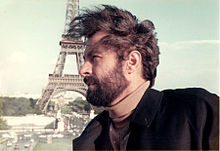Paul Barbă Neagră
This article includes a list of general references, but it lacks sufficient corresponding inline citations. (June 2010) |
Paul Barbă Neagră | |
|---|---|
 | |
| Born | February 11, 1929 |
| Died | October 13, 2009 (aged 80) |
| Nationality | France |
| Occupation(s) | film director journalist screenwriter |
Paul Barbă Neagră (or Barbăneagră) (February 11, 1929 – October 13, 2009) was a Romanian film director and essayist who, starting in 1957, has directed short and medium-length documentaries on topics related to culture and the arts. In 1964, he defected and settled in France, where he also worked in the media (for France 2, France 3, and Radio Free Europe).
Biography
Born in Isaccea, he studied medicine and cinematography in Bucharest, graduating from the I. L. Caragiale Institute for Theater and Film Arts. Between 1957 and 1964, he worked for the film studios of Communist Romania, and, during a visit to Tours (where he was attending the local film festival), sought political asylum.
He was awarded a first prize for the scenario of his film Versailles Palais-Temple du Roi Soleil ("Palace of Versailles, Temple of the Sun King") at the Festival International du Film d’Art (International Festival for Art Films). The film was the first in his series Architecture et Géographie sacrée ("Sacred Architecture and Geography"). To the same series belongs the documentary Mircea Eliade et la Redécouverte du Sacré ("Mircea Eliade and the Rediscovery of the Sacred").
In 1990, he was awarded The French Grand Prix for Audiovisual Arts for his entire activity.[1]
In 2004, he published with Félix Schwarz Symbolique de Paris: Paris sacré, Paris mythique (Les Éditions du Huitième Jour, 2004).
See also
Footnotes
- ^ Romania literara, no. 42, Oct. 23, 2009
External links
- (in French) FES festival - film agenda
- (in Romanian) Short bio
- (in Romanian) Paul Barbăneagră at Poliron.ro
- Paul Barba-Négra "Mircea Eliade et la redecouverte du sacre" on YouTube
- 1929 births
- 2009 deaths
- People from Isaccea
- Radio Free Europe/Radio Liberty people
- Romanian expatriates in France
- Romanian defectors
- Romanian essayists
- Romanian film directors
- Romanian journalists
- Romanian screenwriters
- 20th-century essayists
- 20th-century screenwriters
- 20th-century journalists
- European film director stubs
- Romanian artist stubs
